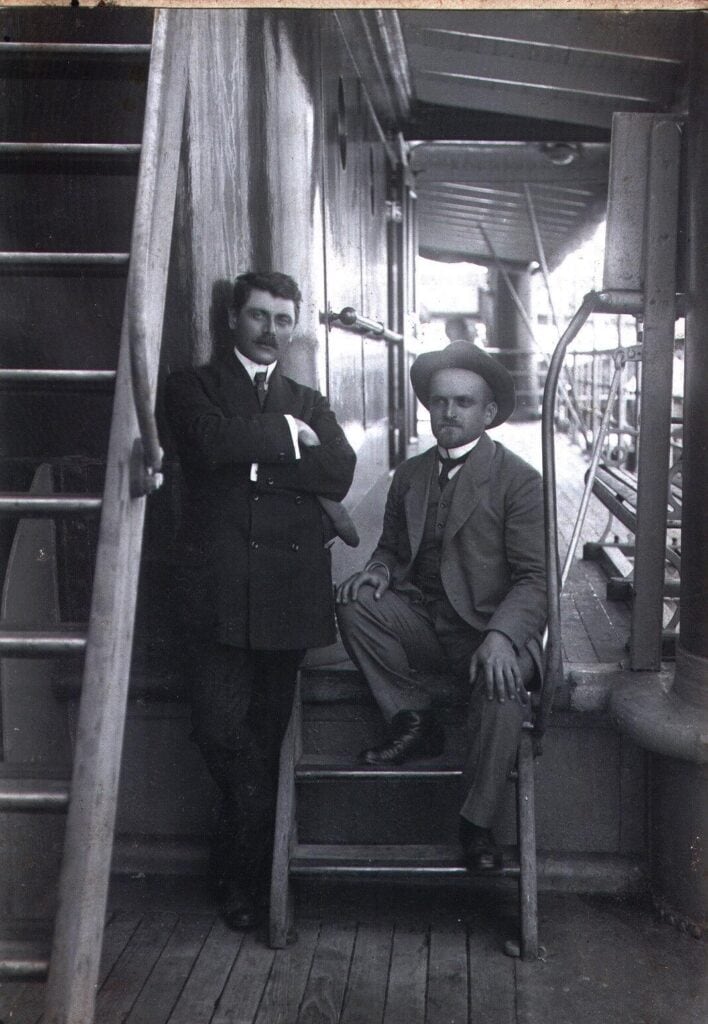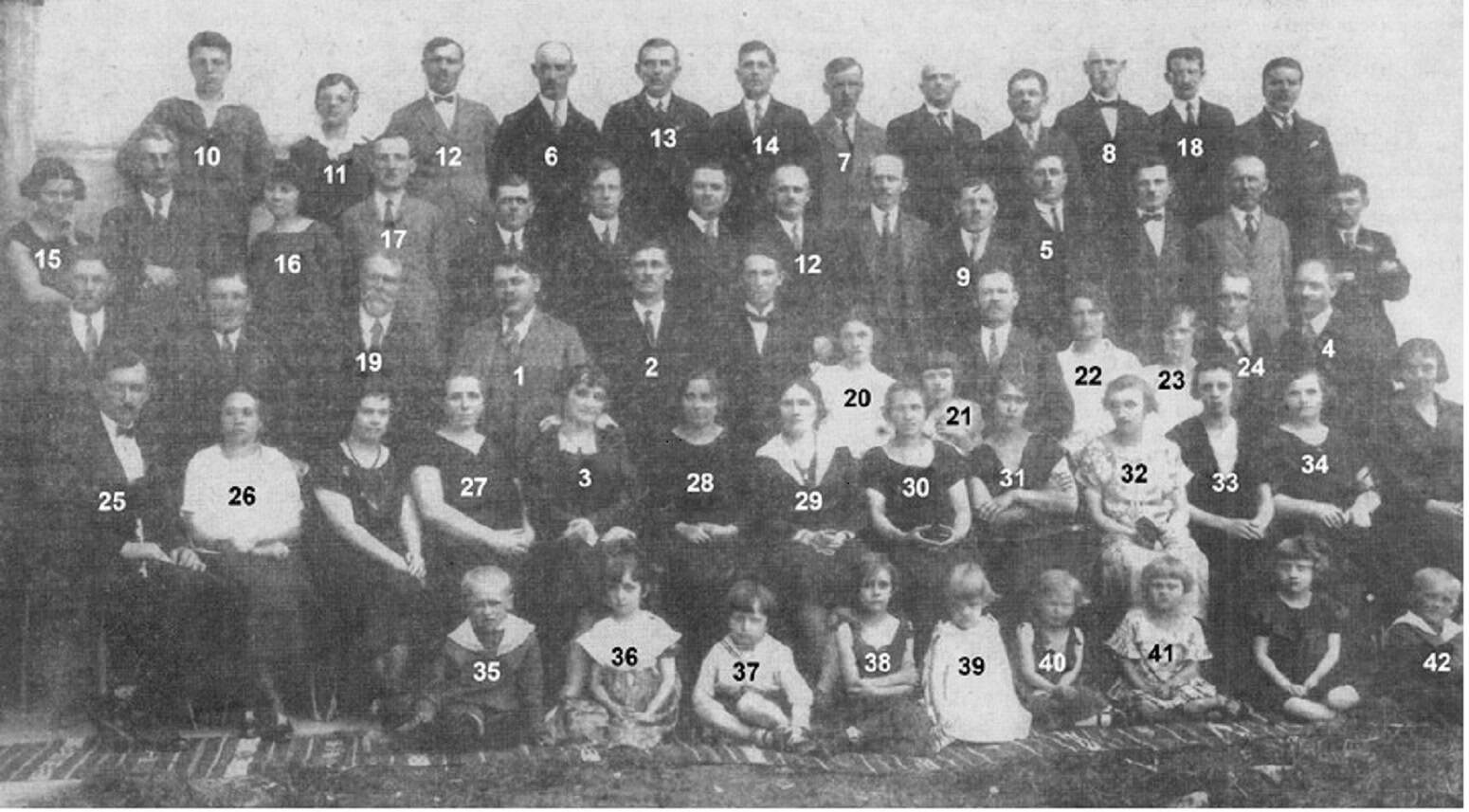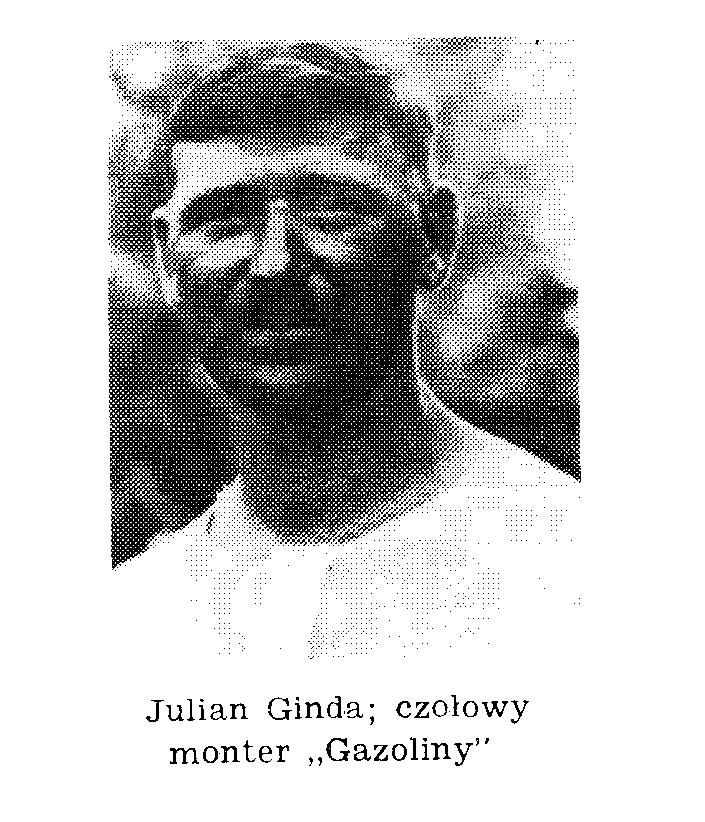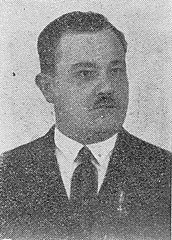THE FOUNDERS OF GAZOLINA SA

Marian Wieleżyński 1879-1945 and Władysław Szaynok 1876-1928 (circa 1912)
For many years, gas found during digging a well or during drilling in the exploration for drinking water or crude oil was a curse for searchers. It posed a hazard to human life and to the environment.
Gas used in the beginning of the oil age was gas accompanying crude oil. At that time, actions of oil workers were concentrated on its transport and usage. However, in early 1900, from the moment crude oil was made more and more available for industrial use, its content of volatile gas was a problem, the gas was burnt or evaporated in the atmosphere. A waste and pollution.
This is where the outstanding engineers Marian Wielezynski and Wladyslaw Szaynok became active together. After familiarization with the gas industry in the United States, in 1913, they built the first gas pipeline that operated until 1930 and the first gas factory in Europe. They deposed several patents on cracking of oil and liquefaction of gas with Professor Moscicki. In 1920, they merged their companies to create and operate within the limited-liability company Gazolina SA.
Marian Wielezynski was also a pioneer in the area of modern management and organization of enterprises. In the Gazolina company, he invented and implemented employee shareholding, which is the subject of interest of many contemporary economists and sociologists. This was a key for the dynamic success of Gazolina SA.
In the years 1920–1939, Gazolina SA was ranked the 7th more profitable Polish company with 100% of Polish capital. Several new gas lines were constructed to distribute gas to industries and individuals, gas stations opened and refineries built. One of the most performing creation of Gazolina SA was gazol (liquefied petroleum gas or LPG), presently called liquid gas. It still occupies an important position in the world trade of hydrocarbons. An interesting fact is that gazol was used in 1938 in gas distribution networks of Gdynia (Gdansk) and also exported in small containers to Belgium, Syria and Palestine
.
THE FIRST EMPLOYEES IN HISTORY TO BECOME SHAREHOLDERS IN THEIR ENTREPRISE

A group of employee-owners of "Gazolina" and their children, 1925.
Photo credit Jerzy Ginda
1. Marian Wieleżyński
2. Julian Ginda -Father of Tadeusz (n ° 6), manager
petrol plant in Hubiczach (Boryslaw district)
3. Ms. Wieleżyńska
4. Ludwik Ginda - Julian's brother
5. Marek Marosz
6. Tadeusz Ginda -
7. Edward Ginda - Tadeusz's brother
8. Wincenty Ginda - Julian and Ludwika's brother
9. Stefan Ginda - Tadeusz's brother
10 / 11. sons of Marian Wieleżyński- Leszek and Zbigniew
12. Franciszek Stocki
13. Janczar - brother of Gustaw Janczar (n ° 25)
14. Unidentified
15. Adela Mus - clerk
16. Cybulska - an administrative
17. Zaleski
18. Duda
19. Unidentified
20/21 Duda girls (n ° 18)
22. Zaleska - wife (no.17)
23. Stefania Ginda - wife of Tadeusz (n ° 6)
24. Nietrzeba- Cashier25. Gustaw Janczar - later manager
gas plant in Tustanowice (Boryslaw district)
26. Konstancja Ginda - wife of Stefan (n ° 9)
27. Janczarowa - wife of Gustaw (no.25)
28. wife of Julian Ginda (n ° 2)
29. Janczar's wife (# 13)
30. Dudowa - wife (# 18)
31. Stocka - wife of Franciszek (n ° 12)
32. wife of Ludwik Ginda (n ° 4)
33. Wiktoria Ginda - Edward's wife (No. 7)
34. Maria Ginda - wife of Wincenty (No. 8)
35. Zdzisław (?) Nierząba - cashier's son (No. 24)
36 and 37. children of Gustaw Janczar (n ° 25)
38. Krystyna Ginda
39. Stanisława Janczar - daughter of Janczar (N ° 13)
40. Izabela Ginda - fille d'Edward (No. 7)
41. fille de Ludwik Ginda (?)
42. Wacław Nietrzeba - cashier's son (no. 24)
ONE OF THE RICHEST EMPLOYEE OF GAZOLINA SA
After more than 20 years with the company as a foreman, Julian owned about 1% of the capital of Gazolina representing a value of 400 000 US dollars 2020.


Bronisław Wacław Wojciechowski (1893-1966)
Financial Director of Gazolina S.A.
He was born in the village of Wygiełzów, in a large, Catholic farming family who was experiencing economic difficulties and was forced to move to the industrially expanding town of Łódź where the family settled in the working-class neighborhood. In an often conflicting social context, marred by strikes and protests that will mark him, Bronislaw is a brilliant student studying business and accounting.
In 1910, he joined the clandestine association of separatist organizations "Zarzew", recently established in Lwow, and he forged his will to sacrifice all his forces in the struggle for Independence of Poland. He enrolled at the Faculty of Law in Krakow and in 2013 was elected President of “Zarzew”.
When World War I broke out, he joined the Legions, then the Uhlans, with whom he ended up in Galicia. He chose then not to pledge allegiance to Austria-Hungary, to resume his law studies in Krakow, and to leave the army. He did so in 1921 with the rank of Captain and the Silver Cross of Virtuti Militari.
He was then recruited by Marian Wielezynski, founder of Gazolina SA. The company had remained true to the founders' youthful ideals and tries to implement the principles of social justice in its professional activities. Bronislaw, who had a painful memory of the social tensions associated with the conditions of industrialization, will devote himself body and soul to the success of the "Gazolina" model, in which he firmly believed. At the end of 1923, he was appointed Chief Financial Executive of the company, that is, he was authorized to sign his financial obligations and took over the management of his financial affairs.
While he was one of the main leaders of Gazolina SA, he was elected a member of the SEJM (National Assembly). In his speeches and actions, he led the fight for national sovereignty first.
During the Second World War, after escaping the systematic massacre of the Polish Intelligentsia, with his wife and children, he joined his old friends in the army and, from the offices of Gazolina SA in Warsaw, he actively participated in the resistance actions of the Polish Secret Army (A.K.). In 1945, he was virtually silenced, but could survive working as a translator.
His military courage and all his life of excellence in his work were honored by the Silver Cross of Virtuti Militari, his appointment as an Officer in the Order of Polonia Restituta, and the reward of the Cross of Independence and the Cross of Value.
He died on June 5, 1966, surrounded by his family.
